Physical Activity Helps Manage Chronic Conditions
Uncategorized | June 29, 2015
[vc_row][vc_column width=”1/1″][vc_column_text]
Physician Subscribed & Monitored Exercise
One of the best actions seniors can take to combat chronic disease is to get moving. Today almost 92% of seniors have at least one chronic condition and 77% have at least two. Chronic conditions are costly and are major contributors to disability and loss of independence. The good news is that at least three of the four chronic conditions that account for the greatest percentages of deaths each year (heart disease, cancer, and type II diabetes) can be managed, mitigated, or even cured in some cases, by adding physician-prescribed and monitored exercise into the overall management program.
Unfortunately, being physically active can be difficult in practice for seniors who have developed a chronic condition. What often happens is that the chronic condition leads to reduced activity, which in turn exacerbates the chronic condition or makes way for new chronic conditions to develop. Thus, a cycle initiates that leads to greater loss of function and independence. Reversing this cycle requires trained medical professionals who can assess seniors’ physical abilities and prescribe a physical activity routine to help them get moving again.
The physical results for seniors who make a lifestyle change to include exercise are impressive. Studies have shown that a regimen of 30 minutes a day, five days a week of moderate exercise reduces the risk of death for those with cardiovascular disease by 20% or more. Physical activity improves the lives of seniors with cardiovascular disease as well by reducing blood pressure, lowering heart rate, lowering cholesterol, and reducing overall body weight. In short, seniors who exercise even though they have cardiovascular disease may simply feel better.
Similar benefits have been found for those with type II diabetes. Exercise can help seniors with type II diabetes regulate their blood glucose, lipid, and blood pressure levels. Diabetics, more so than those with cardiovascular disease, gain a greater benefit from high-intensity exercise. Even doing short intervals of high-intensity exercises for 10 minutes three times a day, for five to seven days a week, can provide substantial health benefits, helping diabetics maintain optimal blood glucose and weight levels.
The risk of certain types of cancer, mainly, prostate, colon, and breast cancers, can be greatly reduced, or recurrence risks can be greatly lowered, by adopting a physically active lifestyle. Cancer patients and survivors can also benefit from increased survival rates and better overall wellbeing when they exercise regularly as part of their disease management program.
Perhaps one of the best things family, friends, and caregivers can do to help seniors with chronic conditions get active is to support, and even join them, in physical activities. If you are unable to be there in person for your senior loved one, hiring an in-home caregiver can help. Caregivers can accompany seniors on walks, support and assist them as they complete medically prescribed exercise routines, and transport them to appointments and physical therapy to help them stay as healthy as possible. To learn more about how in-home caregiving can help your senior loved one, contact your closest Comfort Keepers® office today.
References
Booth, F.W., Roberts, C.K., and Laye, M.J. (April 2012). Lack of exercise is a major cause of chronic diseases. Compr Physiol., 2(2):1143-211. doi: 10.1002/cphy.c110025. Retrieved from http://www.ncbi.nlm.nih.gov/pmc/articles/PMC4241367/.
Durstine, J.L., Gordon, B., Wang, Z. and Luo, X. (2013). Chronic disease and the link to physical activity. Journal of Sport and Health Science 2, pp. 3-11. doi:10.1016/j.jshs.2012.07.009. Retrieved from http://www.sciencedirect.com/science/article/pii/S2095254612000701.
National Council on Aging. (n.d.). Chronic disease self-management: Fact sheet. Retrieved from http://www.ncoa.org/press-room/fact-sheets/chronic-disease.html.
[/vc_column_text][/vc_column][/vc_row]
Individualized Home Care Options
Long-Term Home Care, 24 Hour Home Care & Short Term Care Options Customized for You







